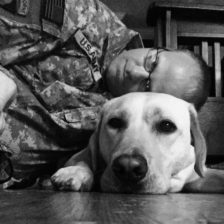I’ve been thinking about moral injury lately. I’m not sure that everyone understands what moral injury might be, or how you even treat it. Do you go to the doctor for it? Is it physical? Is it psychological?
For those of you who may not know, the term “moral injury,” became popularized in 1990 when a psychiatrist at the Department of Veteran Affairs in Boston worked with veterans who were suffering from psychological trauma. Dr. Shay describes the moral injury as this:
A result of being ordered to do something in a “high stakes situation” that violates an individual’s deeply held beliefs about what is right.
Sam suffers from moral injury.
It is real. It comes with memories that he cannot shake at times.
In 2009 when America’s long wars in Afghanistan and Iraq had been dragging on for what seems like the better part of a decade, another doctor at the same Boston VA decided to revisit what Dr. Shay deemed as “moral injury.”
Some of the symptoms used to describe moral injury are often closely related to some of the symptoms used to describe PTSD in veterans. However, there is something that distinguishes the two. With moral injury, there is a constant sense of guilt and shame, or even an ethical “drift,” whereby veterans no longer have a clear sense of right and wrong, or of what makes their lives meaningful.
It is a struggle.
Here’s a way to look at moral injury:
Soldiers can often describe their traumatic events and connect them with moral injury. How do they do that? They suggest that sometimes it is like split loyalties—having to make the impossible decision of betraying an ideal or thought for another. These decisions are often made in the “heat of a moment” so to speak, and in these decisions, there is no real time to think about consequences as it might be a life or death moment.
So what happens when a veteran feels as if they can’t be forgiven for their actions during a war? Do they try to forget? Do they wonder what forgiveness would mean? Do they seek atonement?
Some veterans seek therapy, an outlet where they can discuss this and then get the tools they need to accept and let events, memories happen, and move forward. Other veterans who suffer from moral injury (and those who care for them) sometimes seek a creative deed, like a group such as Team Rubicon or Team RWB where they can help in communities, volunteer, work through disasters and disadvantages.
Some veterans suffer in silence.
Recovery from moral injury starts with understanding, I think—and please know, that is just what I think. I’m not a therapist, I’m not a counselor, I’m just a wife who is a caregiver for her husband, who wants to understand his ups and downs, and wants to help him work through his trauma.
Moral injury is real. Although this might not always be acknowledged as something that veterans suffer from, it is important to understand that there are invisible wounds we cannot see, but we can learn to understand and help veterans heal.

My favorite veteran. Always. <3

“The common therapeutic model, that is, misses the point that PTSD is primarily a moral, spiritual, and aesthetic disorder – in effect, not a psychological but a soul disorder. All of its aspects concern dimensions of the soul, inasmuch as the soul is the part of us that responds to morality, spirituality, aesthetics and intimacy.”
a quote from War and the Soul
by Ed Tick
a book that has helped me come most of the way home. Sam knows how important Ed’s incite has been for me.